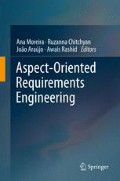Abstract
Identification and resolution of aspectual conflicts should be handled at the requirements level, before major design decisions are made. Treating conflicting situations this early facilitates negotiation among stakeholders. The Aspect-Oriented Requirements Analysis (AORA) approach offers HAM (Hybrid Assessment Method), a technique for the resolution of conflicts between concerns that contribute negatively to each other and have the same importance. HAM uses a multi-criteria decision method to support the resolution of these conflicts and extends this treatment to conflicts between concerns triggered by stakeholders with contradictory interests on a set of concerns. An example taken from the Crisis Management System case study is used to illustrate HAM’s potential support for treating concerns during composition.
Access this chapter
Tax calculation will be finalised at checkout
Purchases are for personal use only
Notes
- 1.
If the priority allocated to each concern is different, the problem is not too difficult to solve.
- 2.
Concern’s contributions represent how this concern affects others concerns. This contribution can be positive(+) or negative (−).
- 3.
Note that the contributions specified here are asymmetric.
References
I. Brito, Aspect-oriented requirements analysis, PhD Thesis, Universidade Nova de Lisboa, Portugal, 2008
T.L. Saaty, The Analytic Hierarchy Process (McGraw-Hill, New York, NY, 1980)
A. Pimentel, Multi-criteria analysis for architectural choices in software product lines, Master Thesis, Universidade Nova de Lisboa, Portugal, 2009
A. Pimentel, R. Ribeiro, A. Moreira, J. Araújo, J. Santos, A. Costa, M. Alférez, U. Kulesza, Hybrid assessment method for SPL aspect-oriented, in Model-Driven Software Product Lines: The AMPLE Way, ed. by A. Rashid, J.-C. Royer, A. Rummler (Cambridge University Press, Cambridge, 2011), pp. 125--158
R. Ribeiro, A. Moreira, P. Broek, A. Pimentel, Hybrid assessment method for software engineering decisions. Decis. Support Syst. 51(1), 208–219 (2011)
L. Chung, B. Nixon, E. Yu, J. Mylopoulos, Non-Functional Requirements in Software Engineering (Kluwer Academic, Dordrecht, 2000)
E. Triantaphyllou, Multi-Criteria Decision Making Methods: A Comparative Study (Kluwer Academic, Dordrecht, 2000)
K.P. Yoon, C.-L. Hwang, Multiple attribute decision making, in Quantitative Applications in the Social Sciences, ed. by M.S. Lewis-Beck, vol. 07-104 (Sage, London, 1995)
H.J. Zimmerman, L. Gutsche, Multi-Criteria Analysis (Springer, Berlin, 1991)
S. Chen, C. Hwang, Fuzzy Multiple Attribute Decision Making: Methods and Application. LNEMS, vol. 375 (Springer, Heidelberg, 1993)
W. Dong, F. Wong, Fuzzy weighted averages and implementation of the extension principle. Fuzzy Sets Syst. 21(2), 183–199 (1987)
Y. Dong, Y. Xu, M. Dai, H. Li, A comparative study of the numerical scales and the prioritization methods in AHP. Eur. J. Oper. Res. 186, 229–242 (2008)
I. Brito, F. Vieira, A. Moreira, R. Ribeiro, Handling conflicts in aspectual requirements compositions in Lecture Notes in Computer Science (LNCS), in Transactions on Aspect-Oriented Software Development, ed. by J. Araujo, E. Baniassad. Special issue on “Early Aspects”, 2007
CMS – Crisis Management Systems, A case study for aspect-oriented modeling (2011), http://www.cs.mcgill.ca/~joerg/taosd/TAOSD/TAOSD_files/AOM_Case_Study.pdf. Accessed July 2011
K.E. Wiegers, Software Requirements, 2nd edn. (Microsoft Press, Redmond, WA, 2003)
I. Brito, A. Moreira, Towards a composition process for aspect-oriented requirements, in Early Aspects Workshop at AOSD Conference, Boston, MA, 2003
I. Brito, A. Moreira, Integrating the NFR approach in a RE model, in Early Aspects Workshop at AOSD Conference, Lancaster, UK, 2004
A. Moreira, A. Rashid, J. Araújo, Multi-dimensional separation of concerns in requirements engineering, in 13th IEEE International Conference on RE, France, 2005
A. Rashid, A. Moreira, J. Araújo, Modularization and composition of aspectual requirements, in International Conference on AOSD, USA (ACM Press, 2003)
R. Wieringa, N. Maiden, N. Mead et al., Requirements engineering paper classification and evaluation criteria: a proposal and a discussion. Require. Eng. 11, 102–107 (2005)
T.L. Saaty, Decision making with the analytic hierarchy process. Int. J. Serv. Sci. 1, 83–98 (2008)
AMPLE project (2011), http://www.ample-project.net/. Accessed July 2011
Author information
Authors and Affiliations
Corresponding author
Editor information
Editors and Affiliations
Rights and permissions
Copyright information
© 2013 Springer-Verlag Berlin Heidelberg
About this chapter
Cite this chapter
Brito, I.S., Moreira, A., Ribeiro, R.A., Araújo, J. (2013). Handling Conflicts in Aspect-Oriented Requirements Engineering. In: Moreira, A., Chitchyan, R., Araújo, J., Rashid, A. (eds) Aspect-Oriented Requirements Engineering. Springer, Berlin, Heidelberg. https://doi.org/10.1007/978-3-642-38640-4_12
Download citation
DOI: https://doi.org/10.1007/978-3-642-38640-4_12
Published:
Publisher Name: Springer, Berlin, Heidelberg
Print ISBN: 978-3-642-38639-8
Online ISBN: 978-3-642-38640-4
eBook Packages: Computer ScienceComputer Science (R0)

